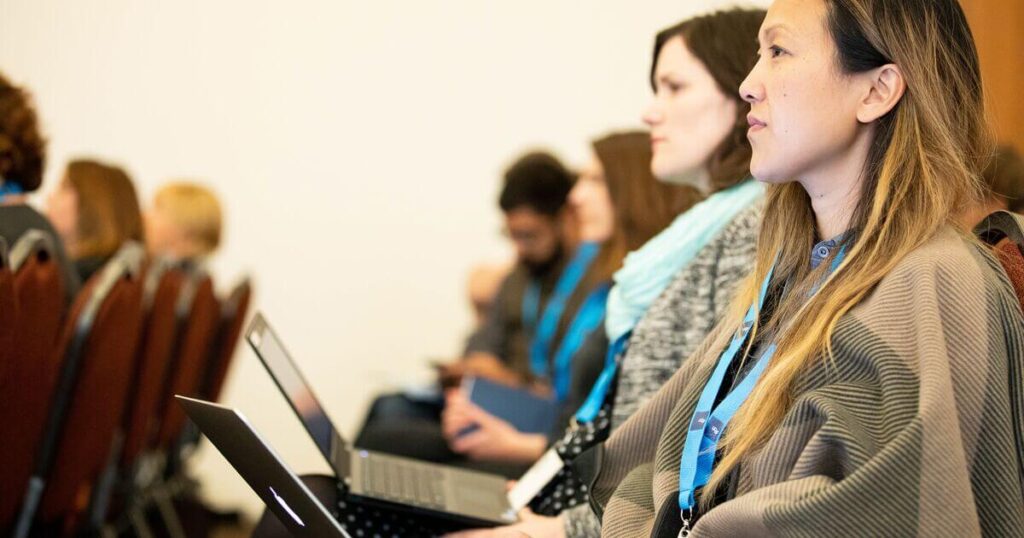
This summer, the UCSF Library Archives and Special Collections hosted the first UCSF Digital Health Humanities Interdisciplinary Symposium. The symposium brought together researchers working at the intersections of health sciences, data science, and digital humanities. The program kicked off with an introduction to Digital Health Humanities (DHH) at UCSF followed by a lightning talk session. These sessions showcased research projects and works in progress related to this emerging domain. The afternoon sessions were topically-oriented panels and speakers shared their projects and resources for analyzing medical literature and addressing challenges and opportunities when working with historical patient records. The post-session discussions emphasized how researchers across disciplines can converge to compare ways of working with digital methods and historical materials. Multi-disciplinary collaborations can provide significant insights into health and healthcare experiences and influences. Researchers from the UCSF community gave lightning talks covering research processes, exploration and experimentation, early findings, challenges, and new research questions under consideration.
Common threads included:
- using industry documents and new analysis methods to identify patterns of industry influence on community organizations and scientific discourse;
- the role of geography in understanding landscapes of disease and activism;
- surfacing and confronting omissions in the historical record, particularly that of marginalized communities; and
- the value and importance of integrating personal experiences in health care provision and historical interpretation of the health sciences.
Each lightning talk included provocative descriptions of how digital methods have been or could be employed to further understanding of health humanities materials. Presenters also discussed how digital methods can support the inclusion of significant, yet overlooked or underrepresented experiences or perspectives. A forthcoming post will summarize presentations from the lightning talk showcase session.
Working with historical patient records
A session on the challenges and opportunities of working with historical patient records as data included panelist presentations representing archival, technological, and historical perspectives. UCSF Associate University Librarian for Collections and UCSF Archivist Polina Ilieva shared how archivists can address the access complications presented by historical patient records to realize their potential as the research subject. Methods include digitizing and presenting data within innovative discovery and responsible access platforms proposed by UCSF Archives and Special Collections. Aimee Medeiros, vice chair and associate professor for the UCSF Department of Humanities and Social Sciences, discussed how research benefits from liberating data from historical patient records for quantitative and qualitative inquiry, especially that which expands and deepens understanding of health sciences knowledge networks, including historical structures of oppression, clinical care, and patient and care providers’ social contexts. The panel presentations concluded with Kim Pham, currently research technology officer at the Max Planck Institute. Pham shared both process insights and ethical access considerations from a “collections as data” project she was involved in at the University of Denver that made patient data from historical records of the Jewish Consumptive’s Relief Society available.
Examining racism in medical literature
Symposium programming closed with a panel presentation and discussion about analyzing medical literature, particularly medical journal archives, to track social topics over time including racism in medicine. Claudia von Vacano the founding executive director and senior research associate of D-Lab and digital humanities at the University of California, Berkeley (UC Berkeley), and Pratik Sachdeva, senior data scientist at the UC Berkeley D-Lab shared an initiative to identify racism narratives in medical literature. Dr. von Vacano explained the need for this project, noting the pervasive reality of structural racism in healthcare and its significant negative impacts particularly on Black and Latino individuals. Sachdeva shared their approach to studying narratives of racism in prominent published medical literature. They identify and analyze racism and power-related terms by adapting a corpus labeling and analysis methodology they established in an earlier D-Lab initiative that measured hate speech.
Melissa Grafe, board member for the Medical Heritage Library, John R. Bumstead Librarian for Medical History and head of the Medical Historical Library at Yale University, presented the range of digitized resources made publicly available by the Medical Heritage Library that can be analyzed to inform research around racism narratives in medicine. This includes State Medical Society Journals, Historical American Medical Journals as well as the curated collection sets Roots of Racism, and Anti-Black Racism in Medicine. Finally, Moustafa Abdalla, a surgical resident and an independent principal investigator at Massachusetts General Hospital in Boston, presented on his textual analysis work. Abdalla has conducted computational research at Harvard Medical School and the University of Oxford and shared his findings from text analysis on more than 200 years of the Journal of the American Medical Association and the New England Journal of Medicine articles. He has also built and shared an N-gram viewer for this data to help others conduct exploratory research across the corpus.
Access symposium recordings
The DHH pilot program has been humbled by the breadth and depth of meaningful work presented during the symposium. We are encouraged by the insights, conversations, and opportunities for future collaboration that were seeded throughout the day. As UCSF DHH programming continues and researcher networks grow, we intend to host future events that build upon the momentum from this symposium! All symposium recordings are now available on the UCSF CLE.
About the Digital Health Humanities program
The UCSF Digital Health Humanities pilot program is funded by the Academic Senate Chancellor’s Fund, via the Committee on Library and Scholarly Communication to facilitate interdisciplinary scholarship that advances understanding of the profound effects of illness and disease on patients, health professionals, and the social worlds in which they live and work. The UCSF DHH was launched in 2022 and provides programming and resources to guide and support researchers in their engagement with digital tools and methods. The program also provides resources for working with archives as data.